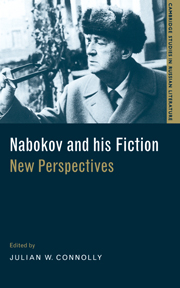Book contents
- Frontmatter
- Contents
- A note on the contributors
- A note on transliteration
- A note on abbreviations
- Acknowledgments
- Introduction: Nabokov at 100
- PART 1 ARTISTIC STRATEGIES AND THEMES
- 1 Setting his myriad faces in his text: Nabokov's authorial presence revisited
- 2 Vladimir Nabokov and the art of autobiography
- 3 The near-tyranny of the author: Pale Fire
- 4 Jewish questions in Nabokov's art and life
- 5 “The dead are good mixers”: Nabokov's versions of individualism
- 6 Nabokov's trinity (On the movement of Nabokov's themes)
- PART 2 LITERARY AND CULTURAL CONTEXTS
- Selected bibliography
- Index
- CAMBRIDGE STUDIES IN RUSSIAN LITERATURE
5 - “The dead are good mixers”: Nabokov's versions of individualism
Published online by Cambridge University Press: 18 December 2009
- Frontmatter
- Contents
- A note on the contributors
- A note on transliteration
- A note on abbreviations
- Acknowledgments
- Introduction: Nabokov at 100
- PART 1 ARTISTIC STRATEGIES AND THEMES
- 1 Setting his myriad faces in his text: Nabokov's authorial presence revisited
- 2 Vladimir Nabokov and the art of autobiography
- 3 The near-tyranny of the author: Pale Fire
- 4 Jewish questions in Nabokov's art and life
- 5 “The dead are good mixers”: Nabokov's versions of individualism
- 6 Nabokov's trinity (On the movement of Nabokov's themes)
- PART 2 LITERARY AND CULTURAL CONTEXTS
- Selected bibliography
- Index
- CAMBRIDGE STUDIES IN RUSSIAN LITERATURE
Summary
The ethical ideology that is evolved in the fictional works of Vladimir Nabokov can be described as an idealistic variety of rational individualism. I shall argue that this is a pervasive stance and that it is reflected in a compromise staged in Nabokov's texts, a middle way between the carnivalesque and the anti-carnivalesque narrative modes.
Individualism as ethical ideology means that moral values are derived not from a vision of a collective good but from a respect and concern for the rights of every single individual – so long as that individual's aims do not encroach on the rights of the individuals around him. One of the most basic rights of the individual is to preserve his or her identity; one of the most basic obligations is to recognize this right for others. Nabokov's characters fall into two groups: (1) those who respect the rights of others to an independent identity (Martin Edelweiss, Fyodor Godunov-Cherdyntsev, Timofey Pnin, John Shade), and (2) those who either solipsistically ignore that right (Ganin, Dreyer) or actively violate it (Hermann, Humbert, Kinbote). The former usually find themselves in a defensive position, repulsing the encroachments of others on their mind and soul, yet at times they embark on pursuits or perform actions that conflict with their self-interest, actions that are entirely selfless, altruistic or motivated by transcendent aims.
Which is what gives their individualism an idealistic coloration. Ethical idealists are not satisfied with the belief in doing as one would be done by; they respect the individual rights of others not because of a calculation that this conduct would boomerang but because it is (deontologically) right.
- Type
- Chapter
- Information
- Nabokov and his FictionNew Perspectives, pp. 92 - 108Publisher: Cambridge University PressPrint publication year: 1999

